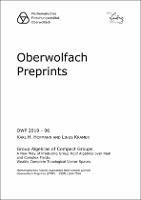Abstract
Weakly complete real or complex associative algebras $A$ are necessarily projective limits of finite dimensional algebras. Their group of units $A^{-1}$ is a pro-Lie group with the associated topological Lie algebra $A_{\rm Lie}$ of $A$ as Lie algebra and the globally defined exponential function $\exp\colon A\to A^{-1}$ as the exponential function of $A^{-1}$. With each topological group $G$, a weakly complete group algebra $\mathbb K[G]$ is associated functorially so that the functor $G\mapsto \mathbb K[G]$ is left adjoint to $A\mapsto A^{-1}$. The group algebra $\mathbb K[G]$ is a weakly complete Hopf algebra. If $G$ is compact, then $\mathbb R[G]$ contains $G$ as the set of grouplike elements.
The category of all real weakly complete Hopf algebras $A$ with a compact group of grouplike elements whose linear span is dense in $A$ is equivalent to the category of compact groups. The group algebra $A=\mathbb R[G]$ of a compact group $G$ contains a copy of the Lie algebra $\mathfrak L(G)$ in $A_{\rm Lie}$; it also contains all probability measures on $G$. The dual of the group algebra $\mathbb R[G]$ is the Hopf algebra ${\cal R}(G,\mathbb R)$ of representative functions of $G$. The rather straightforward duality between vector spaces and weakly complete vector spaces thus becomes the basis
of a duality ${\cal R}(G,\mathbb R)\leftrightarrow \mathbb R[G]$ and thus yields a new aspect of Tannaka duality. In the case of a compact abelian $G$, an alternative concrete construction of $\mathbb K[G]$ is given both for $\mathbb K=\mathbb C$ and $\mathbb K=\mathbb R$. Because of the presence of $\mathfrak L(G)$, the enveloping algebra of weakly complete Lie algebras are introduced and placed into relation with $\mathbb K[G]$.

